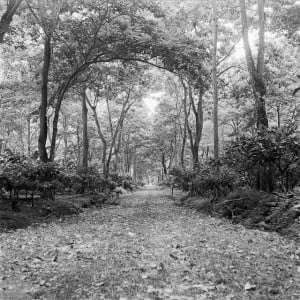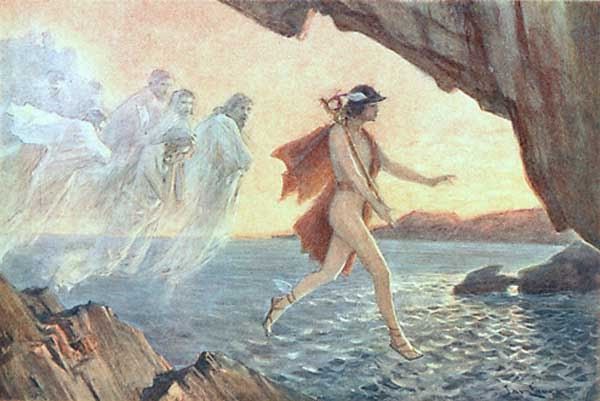Mid-August, Interstate 70, North St. Louis County. Driving home from my parents’ house, where I’d spent hours disinfecting so my father could recover safely from a C-diff infection. He’d picked it up on one of his hospital visits for acute appendicitis or its complications.
I thought of my friends living in and near Ferguson. I wondered what the atmosphere was like for them that day. I had recently moved from South St. Louis city to quiet suburb in west St. Louis County, and I knew that even there, I felt the turmoil on this and other planes following the death of Michael Brown.
I sent a psychic feeler towards the city. A shadow hung over it. Dim forms struggled in it. And above, large, fierce beings fed on the rage, the pain, the misunderstanding. They laughed.
So for me, the veil did not thin this year.
It was ripped open in August.
And the Shadow heritage left by those who walked this bend of the Mississippi River before us rose up, fierce and angry. And all of us had to confront the ugly truth that our lives still are affected by the legacies of slavery, racism and segregation. Those of us who are White had to examine the reality that even if we ourselves live in a diverse neighborhood, or don’t feel privileged, or don’t consider ourselves racist, we still live a far different life from neighbors who are African American. And that their experiences and perceptions must be heard. Because only then can the Shadow start to fade.
Since I last posted in Patheos, I have moved in with my sweet, Shy Engineer. The dress I bought for Easter celebration with his family is packed away with summer clothing. The lively, diverse neighborhood I lived in for so long in South St. Louis has become a memory—and a part of our nation’s evolving conversation on race and police violence.
As has the town in which I celebrate sabbats with my local spiritual community: Ferguson.
I’ll be there this weekend as we offer a communal meal to our ancestors, then ask La Calavera to guide us across the borders of the Land of the Dead to converse.
I would ask, this year, if my ancestors of blood and spirit have gained insight which might help us to heal the racial rifts that have so painfully split our region.
Until I started dabbling on ancestry.com, I had thought my ancestors were relative newcomers to the North American continent. We knew my great-grandmother on Mom’s side emigrated from England in 1889 as a child. My grandfather didn’t know his roots beyond the Central Illinois farmland he worked on. Surely, I reasoned, my people were newcomers here. The slaves were freed and the Native Americans already dead or departed before my family arrived. My genetic hands were clean.
I now know my ancestors include Irish Catholics who were evicted from their ancestral lands by Cromwell, then brought to the colonies as political prisoners in the 17th century, then sold into indentured servitude. It includes those who bought those Irish men and women, and who likely bought Africans to labor beside them on the tobacco plantations of Maryland colony. And who were part of the crafting of the castes of racial identity that would keep African Americans in a separate and unequal status to this day. It includes English Puritans who arrived in Massachusetts Bay Colony as early as 1625, making my ancestors also complicit in the genocide against the land’s First Peoples.
So the tangled lineage that leads to me is made of landowners and forced laborers. Of maidservants and plantation mistresses. Of deeply religious and dedicated, community-oriented and charitable Christians who also were anti-Catholic bigots and racists. I have not thought often of those parts of which I am ashamed. I think of the way my Grandfather could command a room and make people laugh with the stories he told, not that he sometimes called African Americans words I cannot write here. The skill my Grandmothers had in the kitchen and in household organization and crafts, not the slanders against people different from themselves. They were people of their time and place; the words and expressions they used, the opinions they held, were unexamined and reflexive in those instances. I love them, and overlook their flaws.
I looked for their positive qualities in myself, and tried to cultivate them.
But recent events have shown that those intolerant ancestral voices persist. I have heard them from friends, acquaintances, family members. They have sprung up in my own mind, instinctive, reflexive, before reason tamped them down.
And so much personal, ancestral Shadow material has asked to be examined as well. I still am struggling to integrate the knowledge that my people owned other people. And were themselves, at other times, owned. That other ancestors would happily have killed both the Irish Catholics on their native soil, and the Native Americans whose soil they stole to till.
When I first started grappling with those facts, some friends on my Facebook feed said I was being unnecessarily traumatized. How could I KNOW, they asked, that my ancestors had dispossessed the Native Americans whose spirituality has so informed my own? Maybe my ancestors defended the First Peoples. Maybe my ancestors refused to own slaves and were beautifully kind to the indentured servants.
Maybe.
But tobacco was very labor intensive in the 17th and 18th centuries. It is more than likely that there were many servants, both indentured and enslaved. It is quite likely that if the Puritan branch didn’t themselves kill native peoples for their farms, they still were glad to have the farms for which others had done the killing or dispossession.
I know how awful that legacy feels to me. I wonder how it feels from the Western Shore. I wonder how it looks, through the Veil, to see the prejudices that served the nation’s slave-based agricultural economy still in place. I wonder what it is like to know one’s complicity in the creation of so much unprocessed, collective shadow material. Or if that realization has come at all.
Those are the questions I will ask as we approach the time the Veil is thinnest. I will be in Ferguson this weekend. We will eat a dinner honoring our ancestors, then co-create a ritual. In a departure from past years, we will wrap up events by 7 p.m.; Dia de los Muertos is also the second day of a planned four-day series of rallies and actions honoring Michael Brown.
What will we see, and who will step forward, as La Calavera guides us to the land of Ancestors?
I would see those who helped create our region’s and our nation’s collective Shadow of Injustice and Racism. I would ask their assistance in helping dismantle their creation. I would tell them of my own pain in realizing, during the times of most turmoil this summer, that their voices speak to me in spite of all the work I thought I had done in rising above the small-minded, small-town racism that surrounded me as a child.
And I hope that the Mighty Dead who were strong and held light to drive away the Shadows will be there, too. That somehow, the spirits of those who worked to end legal segregation in our area and our country will pass that torch to those who have awakened to the knowledge that we, too, have work to do. That the fight for liberation and whole personhood, for spiritual awakening and freedom, isn’t a niche movement. And that, whether we live in a racially diverse, funky city neighborhood or a quiet leafy suburb, we rise or fall together.











